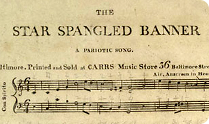The Meaning of
“The Star-Spangled Banner”
Thursday, January 20, 2011
7:00 p.m.–8:30 p.m. (EST)

Leader
George Edward Woodberry Professor in Law, Literature, and Criticism
Columbia University
National Humanities Center Fellow
About the Seminar
We think we know “The Star-Spangled Banner”. But how many of us realize that Francis Scott Key was not looking at the flag we now revere as the original and that he never set foot inside Fort McHenry?
An instant success in 1814, the anthem, or at least its first stanza, opens so many sporting events today that some Americans think it ends with the words “Play ball!” Yet as we anticipate the first pitch or the kickoff, we often fail to pay attention to what our anthem actually says, to its expression of doubt, anxiety, danger, and the difficulty of envisioning a new and unformed republic. And what of the three verses we don’t sing?
Explore the context and meaning of “The Star-Spangled Banner” to show students how it illuminates Enlightenment thought and America’s early struggle to define itself as a nation.
Seminar Recording
Download Recording (You will need to install the WebEx ARF player, available at download, to play back the recording.)
Enter Moodle Forum
Assigned Readings
To incorporate seminar texts into your teaching, we offer the National Humanities Center’s Primary Document Application Form.- “The Star-Spangled Banner” (lyrics as PDF)
- “To Anacreon in Heaven”
- John Adams, “Thoughts on Government”, January 1776
- John Adams to Abigail Adams, 1780
- John Adams to William Cunningham, January 3, 1809 (PDF)
- John Adams to H. Niles, February 13, 1818 (PDF)
- John Adams’s First Inaugural Address, March 4, 1797
- John Adams to Thomas Jefferson, May 19, 1821 (PDF)
- Thomas Jefferson to Roger C. Weightman, January 24, 1826
- Thomas Jefferson to George Wythe, August 13, 1786 (PDF)
- Thomas Jefferson to Mssr. Barbe de Marbois, June 14, 1817 (PDF)
- Thomas Jefferson to William Green Munford, June 18, 1799
- Thomas Jefferson’s First Inaugural Address, March 4, 1801
- Thomas Jefferson to Joseph Priestley, March 21, 1801 (PDF)
- “Reflections” (poem) 1815, by Philip Freneau (PDF)
- “On the Uniformity and Perfection of Nature” (poem) 1815, by Philip Freneau (PDF)
